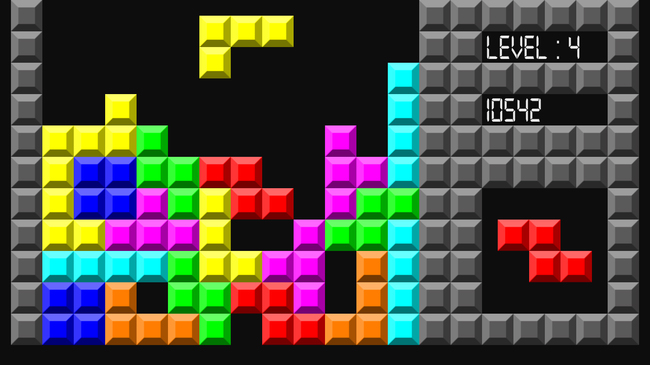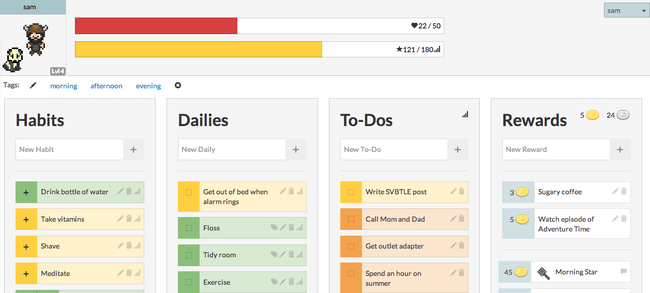Gamifying habits
What we’re working with #
I’ve always struggled with getting things done. Not in a serious, potential depression way, but in the way that I imagine many people do. The alarm goes off in the morning earlier than you’d really like to wake up, so you stay in bed for a few more minutes. Usually that’s not a problem, but every so often you fall back asleep for an hour and suddenly you’re late for work, you’re in a rush, and the rest of your day is a little bit harder. That’s the sort of thing I’m talking about. It’s easy for this sort of difficulty to spread throughout your day. You can still function like a relatively normal person, but everything requires more willpower than you feel like it could or should.
I’ve also always been a gamer. Again, not in a serious, potential addiction way, but in the way that I imagine many people are. I grew up and went through school just as computers and computer games were becoming common sights in the average household. I got a Gameboy around the holidays, and then an Xbox. Around the end of middle school I got into World of Warcraft just as it was starting to gain steam. Soon the idea of experience points, gaining levels, finding loot, building up a character, and so on became integrated into my instinctual understanding of how the world works. The point is not about one specific game or another, but about how the language of game mechanics has become a sort of lingua franca for the way we interact for the world, both because of the ubiquity of computers in our lives and the way that the concept of overcoming unnecessary obstacles, and receiving rewards for doing so, taps into a groove in our minds.
About the not in a serious, potentially addiction way, well, there were a few close calls, and more than a few periods of my life that I’m not particularly proud of. The building blocks of unnecessary obstacles can be put together into some seriously compelling structures, especially once rewards and consequences figure in. The power this sort of system can have over us – and has had over me – can be difficult to face.
This certainly isn’t a new point. Scores of Facebook and mobile games have seized upon the irresistibility of “games” within games: tiers of achievements, creating a vertical progression, can turn even the least remarkable surface mechanic into a market success. Likewise, anyone who’s ever played Tetris understands the undeniable rush of completing even the most arbitrary tasks when they are demarcated properly, and when the obstacle is challenging enough – but not too challenging – and the reward is immediate – but not too easy to get. There’s no doubt that games are an incredibly powerful medium for artistic achievement, but below that the most basic definition possible of the form points out something that has enormous power in accessing and manipulating cognition.
Using the force for good #
With a thriving marketplace of commercial examples and an increasing number of critical explorations, the push to bring the power of gamification into the hands of the consumer is inevitable. Fitocracy comes to mind: the user accrues experience for working out based on the variety and intensity of the workout. The concept makes sense, but I found something about it unsustainable, at least personally. The user experience was a bit rigid, and I felt more like I was slotting my life into the developers’ idea of how working out should be structured. Most importantly, I didn’t feel that sense of shared identity that you can’t help but feel with your character in the best games, the sense that even when you are flying around on a wyrm, slaying murlocs, and accumulating slightly better weapons and armor, that those abilities, accomplishments, and improvements are related to who you are in a positive way. The problem is that, in many classic RPGs, the sense of identity and pleasure is there, but the actual benefit to your life isn’t. With Fitocracy, at least for me, the benefit was clear, but there was not enough identity and pleasure – or sense of really playing a game – to motivate me to stick with it.
A few weeks ago I found HabitRPG. I stumbled upon it completely by chance (I think it might have been an offhand click on a link somewhere deep in the comments of a Hacker News thread) but I was intrigued. I was charmed by the simple pixel-art avatars, the wiki-based community documentation, and the possibility of a new approach to constructive gamification, all enough to make an account. The rationale of the platform becomes apparent as soon as you begin to use it: turn each item on your to-do list into one of three types of task. Habits are behaviours or actions that you want to encourage or discourage. Dailies are the things you need to do every day, or at least on a regular basis. To-dos are the one-time miscellaneous responsibilities, chores, and ideas that arise throughout your life and that at some point or another you hope to check off and forget about. The distribution is structured enough to provide guidance in parsing your to-do list, but open and high-level enough that it can be adapted to several approaches to productivity. It can track individual sets within a workout, or just note that you worked out at all.
The identity component is centred on your avatar, who gains experience when you complete tasks (more experience for harder tasks, based on difficulty ratings you can specify when writing them down) and loses health when you drop the ball. Productivity also nets you gold pieces, which you can use to buy armor and weapons to increase the damage you do to tasks and reduce the damage you take when your tasks get the better of you. The game also encourages you to add your own personalised rewards, which you can then buy from yourself, for yourself. (One of my first moves was to add “Watch episode of Adventure Time” to my personal reward selection available for five gold pieces.) When you get enough experience and level up, the game begins to open up to you. After a point, you can hatch little pets from eggs, and feed them enough food that they grow into mounts for you to ride. I got a panda cub and fed it a potato. You get the idea.
Neither the basic idea nor the technical execution is particularly revolutionary, but the platform is designed in such a way that it just works, and remarkably well. I’m not one for gushing, and especially not one for giving away my food money for products on the internet, but after the string of super-productive days I had with HabitRPG I donated some actual cash to show my appreciation. Now I’m a subscriber – hey, it’s like two cups of coffee per month, or one really good latte.
The platform provides enough of an obstacle-reward structure to keep you engaged, but leaves open the details so that all you have to do is enter your list, and the game begins in terms and on a scale that you understand, because you designed it for yourself. I was surprised at how little it took for me to get things done significantly faster just because I had a concrete reason to want to check them off my list, and therefore to screw around less. I wanted to stop lying around in bed in the mornings, so I added “Get out of bed when alarm rings” to my list of daily tasks, and when I woke up the next morning, I found that I had enough of a reason to get up that I just did it. I turned off the alarm, got out of bed, and went over to check off the task in my dailies list. The same has applied to the tasks that pop up in the rest of my life. I want to do them, but often I just can’t summon the willpower. Adding just a bit of external motivation does the trick in an incredible way. I hope that the benefit continues to accrue, and that the developers continue to improve what is already a surprisingly good service.
And finally, one of the most appreciated personal benefits the game has had for me is that it’s allowed me to take control of that often overmastering force that compels me to grind out levels and search for that one last piece of gear. It’s a force that’s powerful and deep-seated enough that it often goes beyond my attempts to keep it in check. Now I have the means to redirect it at the things that I actually want and need to get done. This is no insignificant feat, and I’m thankful for it.

